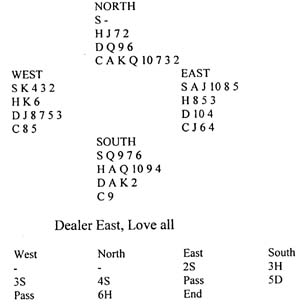|
BRIDGE
 THE
deal comes from junior bridge, Hollandís Jos Scherders, winning a
prize for his brilliant defence in the West seat. He led a low spade,
ruffed in the dummy. When declarer ran the jack of trumps, Scherders
followed smoothly with the 6. Declarer continued with a low trump to the
queen and this time West produced the king. The defenders then scored
three tricks, putting the slam three down. Excellent defence, yes, but
should declarer have seen through it? How would you have played the
slam? After the first finesse had succeeded, declarer could pick up the
trump suit only if East had started with a doubleton or tripleton king.
With such a holding would he not have covered the jack of trumps with
the king? Maybe not, in case his partner held a singleton queen.
Declarer might have tried a different line entirely. Suppose he crosses
to diamond at Trick 2, ruffs a spade, returns to another diamond and
ruffs a third spade. He can then play two top clubs, throwing his last
spade. The line would fail here because when he ruffs a club with the 9
West will overruff and deliver a diamond ruff. THE
deal comes from junior bridge, Hollandís Jos Scherders, winning a
prize for his brilliant defence in the West seat. He led a low spade,
ruffed in the dummy. When declarer ran the jack of trumps, Scherders
followed smoothly with the 6. Declarer continued with a low trump to the
queen and this time West produced the king. The defenders then scored
three tricks, putting the slam three down. Excellent defence, yes, but
should declarer have seen through it? How would you have played the
slam? After the first finesse had succeeded, declarer could pick up the
trump suit only if East had started with a doubleton or tripleton king.
With such a holding would he not have covered the jack of trumps with
the king? Maybe not, in case his partner held a singleton queen.
Declarer might have tried a different line entirely. Suppose he crosses
to diamond at Trick 2, ruffs a spade, returns to another diamond and
ruffs a third spade. He can then play two top clubs, throwing his last
spade. The line would fail here because when he ruffs a club with the 9
West will overruff and deliver a diamond ruff.
 What would you say now on
the West cards? What would you say now on
the West cards?
Answer
Partner may have no points
at all and you should not bid a slam without consulting him. The way to
do this is to make a cue-bid in the enemy suit-here, 4H. If partner is
not completely bereft and holds such as six trumps to the queen, or a
couple of potentially useful cards, he can then head for a slam. Myself,
I will pass 4S is that is all partner can say. Note that a Blackwood 4NT
is pointless.
Awards: 4H-10, 4S-5, 5S-4,
6S-3, 4NT-2.
ó Knight Features
|